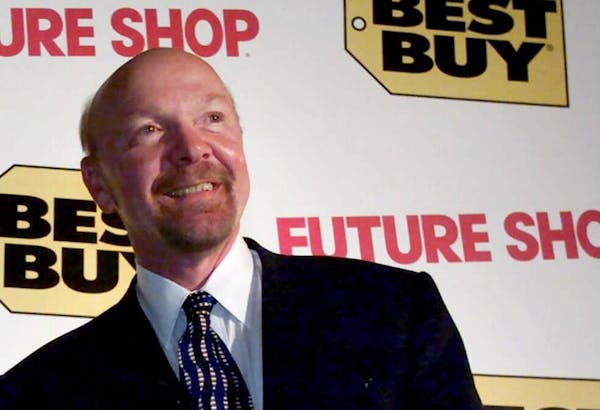Best Buy Co. and founder Richard Schulze can't even agree to take the first baby step in a deal.
Schulze's talks with the board collapsed over the weekend, and not talks on the price or other deal terms. What they failed to agree on is just a simple framework for conducting due diligence research. That's hardly a hopeful sign of further good faith and cooperation.
It's not surprising, as the people involved are only human. And one of them is a founder and living legend who is clearly emotionally invested in the outcome.
Without an ability to interview the principal players, who appear to be communicating largely via news release at this point, it is hard to know anything about the tone of private communications. What is public, however, betrays a genuine sense that it has become heated and that the two sides really do not like each other.
Schulze made his first proposal public with a letter that began "Dear Hatim," as he addressed it to Chairman Hatim A. Tyabji. The tone has gone downhill from there.
Best Buy's board responded by calling it a "highly conditional indication of interest" and said it would consider Schulze's letter "in due course," which the investment community concluded was the corporate communications equivalent of an Adrian Peterson stiff arm.
At a minimum, Best Buy's response suggested a lack of urgency, that the directors would put Schulze's buyout proposal on the agenda of an upcoming meeting, perhaps right after they discussed the board meeting schedule for 2013.
What Schulze has been writing about Best Buy also would be pretty difficult to dispassionately read, if you stood in the shoes of the Best Buy directors or executives, primarily for his consistent accusation they were dithering. Among his observations is "value is eroding every day."
He also raised an alarm in his letter of late last week to the board (and this one skipped the "Dear Hatim") about what he saw as "an erosion of its culture and values."
Both of the letters Schulze released publicly complained about lack of access to due diligence information for the investors and lenders he is lining up to fund his proposed bid, and last Friday the company's board directed its advisers to work out an arrangement to allow Schulze's team to get that access.
That seems pretty straightforward, but in exchange for access, Best Buy pressed for a "standstill," a common provision that would have prohibited Schulze from appealing directly to shareholders if the two sides ultimately came to no agreement on a buyout. The company started at a year and a half, according to a Schulze statement, and pulled back to demanding a standstill just through the end of the year.
That would get Best Buy through the holiday selling season with Schulze under control. But he did not agree. He claimed in a statement that his team thought they were still talking Sunday evening when Best Buy announced publicly that "Mr. Schulze declined to participate" in an "opportunity ... to conduct due diligence" and pursue an acquisition.
If that is really the way it happened, with Best Buy terminating negotiations via news release, then that announcement is a thumb in the eye of its founder and largest shareholder.
That same Best Buy announcement pointed out -- in case anybody was out of town in May -- that Schulze had agreed to step down as chairman in the context of audit committee findings related to the misbehavior of former CEO Brian Dunn.
Schulze is not available to talk about his motivations, but there is no reason to think he lacks the self-awareness to understand his own personal motivation in the pursuit to control Best Buy, which despite the setback this past weekend he intends to keep pressing.
He would almost certainly agree that it is personally agonizing to stand aside and watch Best Buy become what he thinks of as a melting ice cube.
And if Schulze's critics suggest that "this is all personal," he should quickly agree and accept it as praise. Emotional investment, a single-minded dedication to the company's success by its founders, can lead to all sorts of thorny issues around governance and even a determined effort to buy back controlling interest. It also leads to greatness.
There are some outstanding recent examples of founders too emotionally invested to stay away from their old companies, and shareholders can thank the stars that they were. Charles Schwab is one. Another is Steve Jobs at Apple.
Then there is another Schultz in retailing, Howard Schultz, Starbucks' longtime leader. He stepped down in 2000 as the business was booming, and stayed around as chair of its board. In 2007 he complained in a leaked memo that management had turned his company's offerings into a run-of-the-mill commodity. By the end of the year Schultz had seen enough and decided to return as chief executive.
Among his first initiatives was closing all 7,100 U.S. stores one evening in February 2008 to retrain 135,000 in-store employees in such basics as how to make a perfect espresso, a decision he later said "came from love."
As Schultz told Success magazine in a lengthy 2011 profile, "I don't believe you can succeed in business if you don't take it personally."
lee.schafer@startribune.com • 612-673-4302

Schafer: What do you really need to retire?

Schafer: How doing business can be a bit more like Christmas morning

Schafer: There won't soon be another opportunity to rethink the I-94 corridor

Schafer: The fruits of Honeywell's long-game dedication to quantum computer now being seen


